
Civil Society pre-meeting at the Palais des Nations; I am in the back row, 1/3 from the right
On 1-2 March 2018, I represented the International Environment Forum at the UN Economic Commission for Europe (UNECE) Regional Forum on Sustainable Development in Geneva, Switzerland, to prepare for the High Level Political Forum (HLPF) next July in New York. This was the first of similar forums planned for each of the UN Regional Commissions. Almost all the governments of the region sent high-level delegations, many headed by government Ministers. The day before, I joined representatives of other civil society organizations and other stakeholders for a pre-meeting to agree on key points to be raised with governments.

Civil Society pre-meeting at the Palais des Nations; I am in the
back row, 1/3 from the right
The Forum was opened by the President of the UN Economic and Social Council, the Deputy Secretary-General of the United Nations, the Executive Secretary of UNECE, and the Chair of the UN Development Group Team for the region, all women, as the UN has achieved gender balance in its high-level positions.
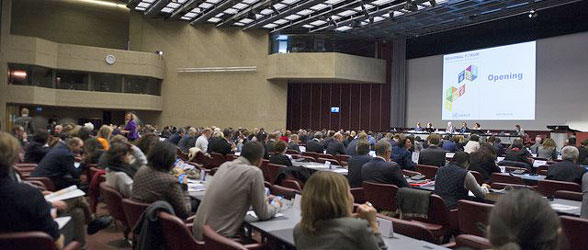
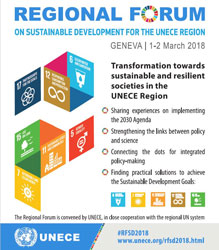
ECE Regional Forum
In a High-level Policy Segment, Professor Peter Messerli of the University of Bern, Co-Chair of the UN Global Sustainable Development Report, presented a review of progress and challenges in implementing the Sustainable Development Goals. He highlighted some of the major challenges, including this critical decade to abandon fossil fuels and avoid a climate catastrophe, growing inequality with 1% of the world population owning half the world's wealth and half the population having 2.4%, and political efforts to reverse globalization and end multilateral engagement. On the other hand, the adoption of the Sustainable Development Goals and the Paris Climate Agreement provide a positive narrative for globalization, but not a users guide for transformation. Instead of the earlier linear vision of sustainable development along three pillars, we now know that the challenges are indivisible and will require hard choices, requiring intentional policies, universal effort and time-bound actions. He cited a recent paper (O'Neill et al. 2018) on a good life for all within planetary boundaries, combining biophysical boundaries and social thresholds, that showed that no country today is both environmentally and socially sustainable. High consumption improves social indicators but is bad for the environment, while some poor countries use only their share of natural resources but fail to meet the needs of their population, and many do poorly on both counts, being both environmental and social failures. All countries must move, but in different directions, and all are linked in a single global system faced with a very real danger of collapse. The Sustainable Development Goals indicate the way forward, but there are synergies and conflicts between goals that must be addressed together across silos and at multiple levels. To move ahead, we need both the factual certainty of science and high societal agreement. The Global Sustainable Development Report (UN 2016, next due in 2019) tries to support this. This requires contextualized and balanced perspectives and knowledge for policy transformation, but in the present world, knowledge is highly unequally distributed. Agenda 2030 gives us a vision for humanity in the Anthropocene, but we need transformations capable of embracing emergent phenomena. Professor Messerli ended by asking what knowledge and what science can support this?
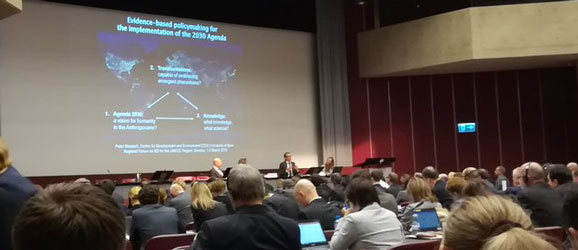
Presentation by Prof. Messerli
There were then a series of 10 parallel peer learning roundtables where governments could share their experience in implementing the different SDGs on the agenda for the HLPF. For SDG6 on clean water and sanitation, they discussed making universal access to water and sanitation a reality, and sharing water by balancing competing needs in a context of a declining resource. For SDG7 on affordable and clean energy, the focus was on improving the efficiency of the energy system and on transforming energy sources. On SDG11 sustainable cities and communities, reflections were shared on financing the transition to sustainable cities and promoting resilient and sustainable cities and human settlements. For SDG12 on responsible production and consumption, the two round tables addressed successful approaches to delivering on sustainable consumption and production by 2030, and towards a circular economy including innovation for sustainable value chains. Finally, on SDG15 life on land, the discussions addressed sustainable forest management, and biodiversity at the heart of sustainable development.
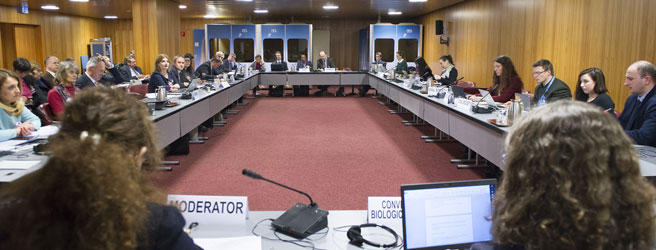
Round table on SDG15 biodiversity; I am in back on the left
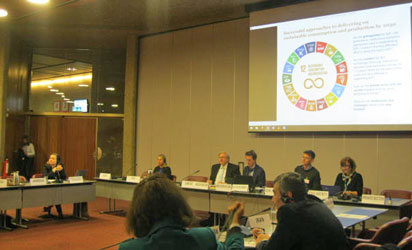
Round table on SDG12, sustainable consumption and production
As with all UN meetings, there were a variety of side events on adolescents and youth, rural women, gender equality and citizen engagement, among others. I contributed to the one on citizen engagement.
In closing, the Director-General of the UN Office in Geneva noted that implementing the 2030 Agenda was off to a slow start. We need urgent action and a fundamental shift in the dominant development model in all countries.
REFERENCES
Daniel W. O’Neill, Andrew L. Fanning, William F. Lamb, Julia K.
Steinberger. A good life for all within planetary boundaries. Nature
Sustainability, 2018, https://www.nature.com/articles/s41893-018-0021-4
UN. 2016. Global Sustainable Development Report.
https://sustainabledevelopment.un.org/globalsdreport/2016
Last updated 11 March 2018